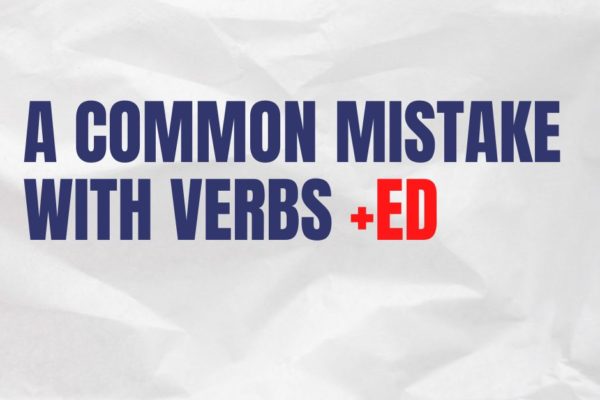Disclaimer: Before we even start speaking about mistakes, I want to clarify two things:
1. It’s okay to make mistakes. You can’t avoid them when you learn something new.
2. Mistakes are the best way to learn anything. If you make a mistake, you’re unlikely to forget the lesson.
I list these mistakes to show that they are common and to help you to fix them.
1. “He don’t work”
3. “I have not” instead of “I don’t have”
4. “Chilrdrens”
6. “Make homework” and “do mistakes”
8. “I found it in the website”
9. The pronunciation of ‘says’ and ‘said’
Okay, let’s dive into it.
1. “He don’t work”
It’s a common mistake not only for Elementary and Intermediate students but for some Upper-Intermediate students too.
We usually know the rule but don’t always follow it when we speak.
To be honest, I myself sometimes make this mistake when I’m tired or don’t control my speech.
How to fix:
Use ‘do’ with “I, you, they, we”. / I don’t work. We don’t work often.
Use ‘does’ with “she, he, it”. / She doesn’t work. He does homework.
2. “I am work” or “I working”
Here Present Simple (I work) and Present Continuous (I am working) are mixed.
When we speak about general truths, facts, habits and daily routines, we use Present Simple. – I work. She (He, it) works.
When we speak about processes, we use Present Continuous. – I’m working. She (He, It) is working. They (we, you) are working.
How to fix:
Use ‘a person/thing + V1’ for Present simple – I work. (no need for the verb be)
Use ‘a person/thing + BE + V-ING’ for Present simple. – I am* working. (‘am’ – is a form of ‘be’ for ‘I’).
You can find more info on be vs regular verbs here.
3. “I have not” instead of “I don’t have”
When students want to say “I don’t have children” they often say “I haven’t children”.
It’s all because of the verb ‘have’ that can play different roles in sentences. But when it shows something you own, you should treat it as a regular verb.
When you want to say a negative sentence with a regular verb in the Present Simple, you use ‘don’t’ or ‘doesn’t’. I work. – I don’t work. She works. – She doesn’t work.
The same works for ‘have’ or ‘has’ in the present tense and ‘had’ in the past tense.
I have children. – I don’t have children. – She doesn’t have children.
I had children. – I didn’t have children. – She didn’t have children.
How to fix:
Use these formulas for the Present Simple:
I (You, we, they) + don’t + have
She (He, It) + doesn’t + have
Use this formula for the Past Simple Tense.
I (She, He, It, They, You, We) + didn’t have
4. “Chilrdrens”
We normally add ‘s’ at the end of the word when it’s plural. /Girl – Girls, apple – apples.
But some English words have a different word for their plural form.
Here are the most common:
– man – men; woman – women
– child – children; human/person – people
How to fix:
Don’t add ‘s’ to children, people, women, men.
5. Interesting vs Interested
Sometimes even upper-intermediate students make this mistake.
How to fix:
– Use ‘interesting’ to describe a person or thing you like. /Sally is an interesting person.
– Use ‘be + interested in’ to describe someone’s interest in something. – I am interested in history.
I have a detailed post on this pair with the quiz.
6. “Make homework” and “do mistakes”
In my native language, there’s no difference between do and make. But there’s a difference between these verbs in English.
How to fix:
Use ‘do’ for processes. I do exercises. She did homework.
Use ‘make’ for results. I made a mistake. She made a cake. He often makes decisions.
7. “I very much like it”
The problem with this sentence is the words’ order. English sentences have a direct order:
– You first say who or what (subject of the sentence);
– Then you use a verb;
– And only after you add other details.
So, the right order for this sentence would be: I like it very much. (I – a person, like – a verb, action and then ‘how’ – very much).
How to fix:
Stick to the direct order:
[someone or something] + [verb] + [other details]. I do my homework in the evening. She didn’t want to disturb him.
8. “I found it in the website”
Anything that is related to the internet and online would be with the preposition ON.
I met her on Facebook.
I read it on that website.
9. The pronunciation of ‘says’ and ‘said’
The word ‘say’ is pronounced with the ‘eɪ’ as in ‘day’ sound – ‘sei’.
But then it changes it form to ‘says’ or ‘said’ the ‘eɪ’ sound disappears.
‘Says’ is pronounced as ‘ses’ and ‘said’ is pronounced as ‘sed’.
Now, let me know if you make any of these mistakes while speaking English.
Need some extra help with your English speaking skills? Sign up for 1:1 classes here.
![9 Common Mistakes My Intermediate Students Make When They Speak English [and How to Fix Them] Vocabulary & Speaking Practice](https://about-english.com/wp-content/uploads/2020/07/2020-07-26_14-06-24.png)
![9 Common Mistakes My Intermediate Students Make When They Speak English [and How to Fix Them] 9 Common Mistakes My Intermediate Students Make When They Speak English [and How to Fix Them]](https://about-english.com/wp-content/uploads/2022/06/190188052_346442340485120_1892662313522663719_n-150x150.jpg)



